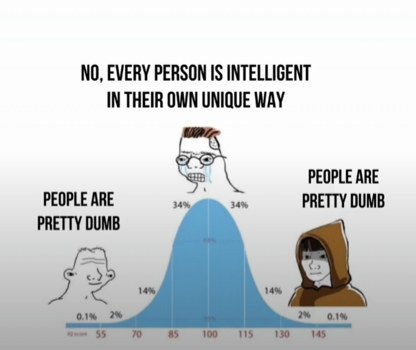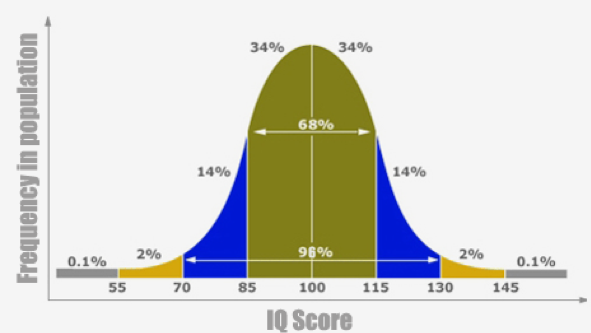
SIMPLE PLAN: IQ & WHAT IT MEANS FOR AMERICAN SOCIETY
There’s been a lot of talk about IQ on the internet lately. “Low-IQ,” “brainrot,” “midwits,” “Kamala Harris”…all kinds of euphemisms referring to people who shouldn’t have any say over the lives of others through democratic elections.
For all the fun that is had with Wojak memery,



there are very real phenomena with real-world implications affecting not only American discourse, but also the American economy. You may have noticed that the recent iteration of AI technology has begun to result in mass layoffs and the restructuring of skilled labor. Why is it that not only corporate journalists and marketers, but also many lawyers and software developers, are finding themselves between jobs, or at least more dispensable at their current employers?
Much of the media tend to gloss over or outright bastardize the concept of IQ. While even scientists will sometimes define IQ as “how smart someone is” as an oversimplification for the public, that definition doesn’t really tell you anything. What does it mean to be smart in the first place? And does being smart say anything about other aspects of your life or experience?
Before I get into it, I’ll give some disclosure that my own IQ is somewhere in the upper 50% of the normal distribution, which only means I’m anywhere between Taylor Lorenz and Elon Musk. In fact, virtually all readers who have made it thus far into this article and understand most of it likely fall into the same range, so I’m hoping I don’t at all come across as smug. I know both what it’s like to deal with idiots, and how it feels to be a complete retard among my betters. Just reporting some common knowledge from the world of psychology, here.

Intelligence Quotient is one of the foundational measures of modern psychology, so much so that Dr. Jordan Peterson says to deny the efficacy of IQ is to deny the efficacy of the entire field of study. There has been enough attention paid to this area of research for over a century, that there are multiple tests that are used to determine it, mainly the Stanford-Binet and Weschler (WAIS), among others. Many psychologists will say, for that reason, that there exist “multiple intelligences” for human beings. To explain in layman’s terms, there are different ways to be smart and different variables that can be taken into consideration. Ever meet someone who’s really book smart? Street smart? Good with numbers? Good with languages? That’s why these tests tend to have several subsections that enumerate verbal comprehension, working memory (short-term retention), picture completion, quantitative reasoning and visual-spatial processing, for instance. The SAT is even an IQ test of sorts. I’ve applied for jobs at a few companies here and there who include in their assessments miniature versions of these tasks, such as finding patterns in how a shape is rotated:

(The answer is A, by the way)
Historically in TV shows and films, intelligence has often been shown as mere memorization. Some nerdy kid is able to recite dictionary definitions, or the scientific name for a marsupial, or the chemical formula for a rare compound, and audiences are astounded by the instant recall. Other times, a prodigy is shown to have extreme talent in playing a musical instrument, programming a computer or building an architecturally sound model of a bridge out of Legos. Long-term and working memory are certainly some metrics of IQ, but they make up a fraction of the picture.
If you’ve ever seen Rain Man, you know that Dustin Hoffman’s character is supposed to have a form of autism. This character is based on a real person named Kim Peek who, while at first thought to be autistic, actually was born without a corpus callosum; the two hemispheres of his brain were missing some connecting nerves. This meant, to put it into computer terms, his brain did a lot less “de-fragging” and prioritizing of data than that of most people, allowing for immense memory storage. Peek would tour around the world with his father, displaying his savantism by giving the weather report for any city on any date in history, complete with the day of the week, whenever prompted. He would also include pleasantries, such as “You’re a great lady,” but these were likely go-to phrases that he learned as appropriate communication—much the same way that Siri or Alexa are programmed to appear socially literate. Peek could read two pages of a book at once, one with each eye, in as little as eight to ten seconds, and memorized the entire index of his father’s encyclopedia set by age two. However, he was severely lacking in motor skills, and needed help with simple tasks like buttoning his shirt, even as he approached his sixties.
Kim Peek was able to memorize information, but had difficulty with expressing original thought or solving mathematical problems. He couldn’t even tell you his favorite color, as this would require a more abstract layer of processing. This is why his IQ was at one point calculated as 78, below average, although his unique condition made proper measurement near impossible.
This may offer insight into why many midwits among us are able to access certain levels of professional careers, even make a nice living, while contributing little enough to be replaceable during waves of innovation. Corporations still need pencil pushers, yes-men and cheerleaders. There are also tons of government employees and customer service agents for insurance companies, who can regurgitate policies and regulations by heart, but will never be able to find solutions outside of their given scripts. If, God forbid, the computer system goes down, or a customer presents with a novel situation for the agent, there might be a 45-minute wait to transfer the call to someone higher up. Figure out a way to automate these jobs, such as with a recorded menu system or AI chatbot, and entire segments of the workforce are suddenly left searching for the next thing that must be done in the economy.
Having a genius-level IQ isn’t exactly a walk in the park, either. For one thing, 99% of everyone else might be slow and uninspiring enough in comparison that everyday interactions are exhausting—hence, a high prevalence of introversion and depression among this faction.

It also doesn’t do much good without a healthy amount of conscientiousness, which is why the guy stocking comic books on the shelf won’t shut the fuck up about his PhD in comparative literature. Moreover, accomplished academics like Stephen Hawking and Neil DeGrasse Tyson have shown that any genius outside of his own area of expertise is “just as dumb as the next guy.” That is, high IQ doesn’t mean an individual knows everything across a variety of subjects. Nor does this gift equate to having superior morals, as many Soviet planners and the movie Mars Attacks! proved in the 20th Century. Having a high IQ only means that a person has the potential to use his or her brain to accomplish difficult feats and do good for others. While it generally stays constant, IQ can fluctuate a bit throughout one’s lifespan, and can decline more drastically by way of injury, substance abuse and lack of intellectual stimulation. There is indeed something to that whole brainrot idea. And imagine the unrealized potential in some of these gifted people who are discouraged by their environment or otherwise suffer from low levels of self-confidence.
One other major facet of intelligence, and perhaps the most overlooked by the media, is the ability to process information. As mentioned earlier, being able to recognize patterns and making informed projections demonstrate a more complex level of thought. Only people with at least average intelligence can use given information to create new ideas, such as starting with a finite list of words to create a short story. If you have a recipe for meatloaf that serves four people, but you have a group double that size coming over in two hours, can you adjust the ingredients to fit your needs?
Abstraction is an important part of processing that tends to separate the men from the boys, and one popular test of this is the “breakfast problem”:

This question is only one or two layers deep (a counterfactual conditional), but you’ve likely seen a similar inability to process a hypothetical scenario among several pundits on corporate news networks, as well as politicians. Many people who fall at an IQ of 95 through 105 may have this deficiency, which covers wide range of the population. You may know a few people like this at your job or school, for that matter. If that’s a possibility for those of average intelligence, then what is to be expected of those well below average, as much as 15-20% of the population?
I don’t say the entire lower 50%, because a human being is only able to go so low in IQ before losing enough intelligence to function in society. Below 70, most scales begin to diagnose an intellectual disability. Forrest Gump was fairly accurate in portraying him around 75. Capable of learning basic skills, but requiring a lot of instruction. The football scholarship helped a bit too.
For most scales, going below 60 is likely Down’s Syndrome territory or some other highly noticeable condition. Even lower than that gets into non-communicative individuals or those in a vegetative state, whose brain activity is occurring mostly in the cerebellum and not so much in the prefrontal cortex. They may breathe or take in images, but cannot make sense of their surroundings or survive without constant supervision.
This man, who has an IQ of 75, would be capable of having a decent conversation with the average human, but a minute or two in most people would notice that something is a little off. He can use a microwave and can read a bit, but he has trouble using measuring cups and spoons, especially when the measurements involve fractions. It appears he might still be suitable for certain jobs as a janitor or a store greeter, but could be incapable of remembering too many details about which kinds of cleaning fluids to use on which surfaces. He certainly wouldn’t be an asset on the cash register. Increasing virtualization of tasks in the internet age is also a huge threat to this cohort. Even a user-friendly iPad app could contain an overwhelming navigation menu. This is different from a senior citizen lacking computer savvy, who is simply used to older technology.
Dr. Peterson has discussed on a few occasions that the U.S. military has decided not to recruit anyone with an IQ below 83-85. That is important, he says, because that means even an institution willing to draft as many troops as possible in emergency situations finds such people to be too risky in their limitations. However, this represents 10-15% of the U.S. population, meaning that many adults are unaccounted for in the workforce. They are still human beings, with a need for dignity and purpose, but cannot be trained to do most simple tasks, even after hours of instruction. Many of them also don’t have caregivers, and are provided with taxpayer-funded services in order to survive.
When the government dismisses entire industries in its legislation, such as coal mining, farming, oil drilling, manufacturing or even tech, it’s easy for the Establishment to look down on the “rednecks” or the “bros” who must find another industry or “learn to code,” sometimes requiring these people to move to entirely different regions of the country. This is upsetting enough, as politicians are often quite candid about their disgust for the builders of America. But when AOC blocks the opening of an Amazon facility, or when Biden shuts down American energy production, it isn’t just the imagined desk jockeys and toxic males they’re hurting. Every regulation, every denied permit, every illegal immigrant, is pulling away opportunities for the most vulnerable low-skilled/unskilled labor. Anyone who could have worked on the maintenance or operations staff of a fulfillment center, or waited tables at a restaurant, or been hired for odd jobs by someone who kept more of their disposable income, is held hostage by anti-growth policies.
Take away these opportunities, and this country is left with an army of idle hands, prone to listlessness, crime and drugs. What else is there to do with so much spare time and so little meaning?
Government needs to stay out of the way of both high and low-IQ citizens, because it otherwise stifles the natural curiosity and ambition of the geniuses, while brewing potential resentment among the less advantaged. However, it remains to be seen how the latter can be accommodated with options that don’t involve becoming a burden of the State. It’s only a matter of time before these tough questions will need to be answered. Hopefully, the second Trump administration will start to hack away at the red tape constraining industry, and the de-DEI-fication of universities will enable real economic solutions unfettered by ideology. This is what the Americans who’ve been falling through the cracks these past several decades have been waiting for all along.
Not only am I optimistic about the future, but I did eat breakfast this morning.